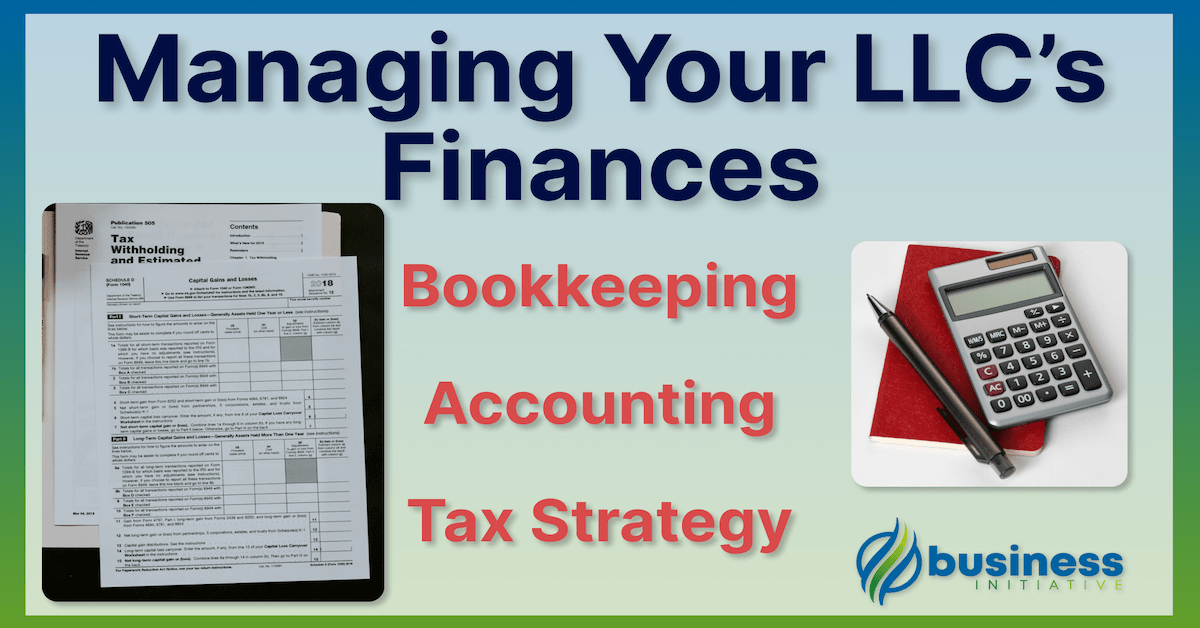Starting and running a Limited Liability Company (LLC) can be an exciting and rewarding journey.
However, managing your LLC’s finances can often be a daunting task, especially for entrepreneurs with little experience in bookkeeping, accounting, and tax planning.
 Key Takeaways
Key Takeaways
- Choose single or double-entry bookkeeping based on your LLC's size for accurate financial management.
- Use accounting software like QuickBooks, Xero, or FreshBooks to streamline bookkeeping and minimize errors.
- Minimize taxes by selecting the right classification, deducting expenses, and making retirement contributions.
- Regularly produce income, balance, and cash flow statements to monitor and guide your LLC's financial decisions.
- Stay organized, separate finances, seek advice, update on tax laws, and regularly review budgets for effective financial management.
In this article, we will explore best practices and tools for managing your LLC’s finances effectively and provide practical lessons to help you maintain accurate financial records and maximize profits.
 Table of Contents
Table of Contents
Bookkeeping Methods

Bookkeeping is the foundation of your LLC’s financial management.
It involves recording and organizing all financial transactions, including sales, expenses, and payroll.
There are two main bookkeeping methods to choose from: single-entry and double-entry.
Single-entry bookkeeping
This is a simple method suitable for small businesses with few transactions.
It involves recording transactions in a single ledger with two columns: revenue and expenses.
However, single-entry bookkeeping may not provide a comprehensive picture of your LLC’s financial health.
Double-entry bookkeeping
Double-entry is a more advanced method that records each transaction in at least two accounts – debits and credits.
This method provides a more accurate and detailed representation of your LLC’s financial position.
Most businesses, including LLCs, prefer to use double-entry bookkeeping for its accuracy and reliability.
Accounting Software
Accounting software can help streamline the bookkeeping process and reduce the risk of errors.
Some popular accounting software options for LLCs include:
-
QuickBooks Online: A cloud-based accounting solution that offers various features, such as invoicing, expense tracking, and financial reporting. It also integrates with third-party apps to automate tasks and save time.
-
Xero: A user-friendly, cloud-based accounting software that provides a wide range of features, including bank reconciliation, inventory management, and payroll. Xero also offers numerous integrations with other business tools.
-
FreshBooks: An easy-to-use invoicing and accounting software designed for small businesses and freelancers. FreshBooks offers time tracking, expense management, and customizable invoices, among other features.
Tax Planning

Effective tax planning can minimize your LLC’s tax liability and help you save money.
Some popular tax strategies you should know about are…
-
Choosing the right tax classification:
LLCs can choose to be taxed as a sole proprietorship , partnership, or corporation.
Each classification has its own tax implications, so consult a tax professional to determine the best option for your LLC.
-
Deducting business expenses:
LLCs can deduct many business expenses, such as rent, utilities, and office supplies.
Keep accurate records of your expenses and consult a tax professional to maximize your deductions.
-
Contributing to retirement accounts:
Contributions to retirement accounts, such as SEP IRAs and solo 401(k)s, can reduce your LLC’s taxable income.
Consult a financial advisor to determine the best retirement plan for your LLC.
➤ Need personalized assistance? Book a FREE Consultation with us TODAY!
Financial Reporting

Regular financial reports are essential for monitoring your LLC’s financial performance and making informed business decisions.
Key financial reports and metrics include:
-
Income statement: Also known as a profit and loss statement, this report shows your LLC’s revenues, expenses, and net income over a specific period.
-
Balance sheet: This report provides a snapshot of your LLC’s assets, liabilities, and equity at a specific point in time.
-
Cash flow statement: This report tracks the flow of cash in and out of your LLC, providing insights into your business’s liquidity and solvency.
9 Practical Takeaways to Properly Manage Your LLC’s Finances
Now that we’ve covered the basics of managing your business’s finances…
Here are some practical tips to help you maintain accurate financial records and maximize profits:
1. Stay organized:
Develop a system for organizing and storing receipts, invoices, and other financial documents.
This will make it easier to track expenses and prepare for tax season.
2. Reconcile accounts regularly:
Reconciling your bank and credit card accounts regularly will help you catch errors and monitor your cash flow.
3. Monitor financial performance:
Review your financial reports regularly to track your LLC’s performance and identify areas for improvement.
4. Seek professional advice:
Consult with a bookkeeper, accountant, or financial advisor to ensure you’re managing your LLC’s finances effectively and staying compliant with tax laws.
5. Track your time:
Accurately tracking the time you spend on projects and tasks can help you bill clients more accurately and identify areas where you can improve efficiency.
6. Separate personal and business finances:
Keep separate bank accounts and credit cards for your LLC to avoid commingling funds.
This will make it easier to track expenses and maintain accurate financial records.
7. Stay up-to-date on tax laws:
Tax laws change frequently, so it’s essential to stay informed about any new regulations that may affect your LLC’s tax liability.
Consider working with a tax professional who can keep you informed of any changes.
8. Invest in accounting software training:
If you’re using accounting software, investing in training or tutorials can help you maximize its features and save time on bookkeeping tasks.
9. Regularly review your budget:
Reviewing your budget regularly can help you identify areas where you can cut costs or invest more resources.
Use this information to adjust your financial strategy and make informed business decisions.
In Summary…
Effectively managing your LLC’s finances is crucial for success.
By implementing sound bookkeeping methods, using reliable accounting software, planning for taxes, and regularly reviewing financial reports, you can maintain accurate financial records and maximize profits.
Are you considering forming your own LLC or other business entity?
Don’t let financial management be a roadblock to your success.
With the tips and strategies outlined in this article, you can take control of your finances and set yourself up for long-term success.
Have questions?
Reach out to Business Initiative here
or, send us a direct message on X
From choosing the right bookkeeping method to selecting the best accounting software, planning for taxes, and regularly reviewing financial reports, we’ve got you covered.
Don’t wait…
Schedule a consultation call to start implementing these strategies today and unlock your LLC’s financial potential!


